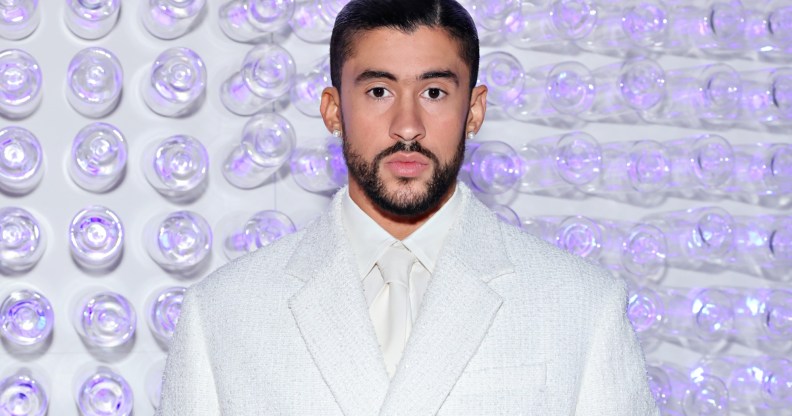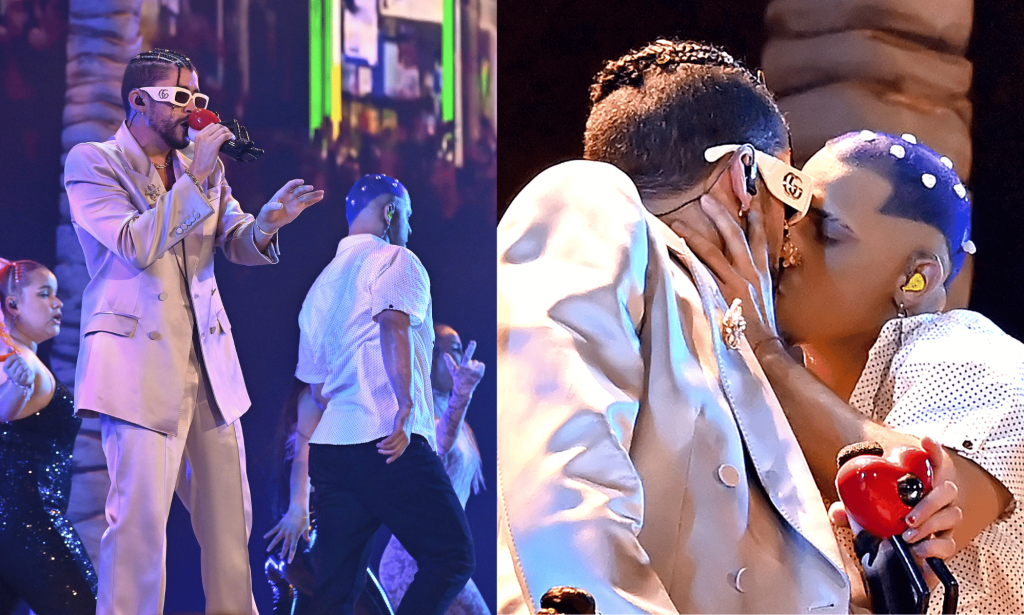Bad Bunny says he faces ‘endless’ sexist and homophobic comments over his style

Bad Bunny addresses queerbaiting allegations for dressing femme. (Getty)
Grammy award-winning artist Bad Bunny has reflected on the “sexist and homophobic” comments he receives for dressing in feminine clothing, amid queerbaiting allegations.
The Puerto Rican rapper, whose real name is Benito Antonio Martínez Ocasio, has made waves in the music industry over the past few years. In 2022, he beat music megastars such as Taylor Swift to be crowned Spotify’s most-streamed artist and embarked on the highest-grossing tour ever for a Latin artist, El Último Tour del Mundo.
The 29-year-old has also landed two consecutive Grammys in the Best Música Urbana Album category.
Despite all this, Bad Bunny has also had to battle accusations of ‘queerbaiting’ from fans. The “Moscow Mule” hit-maker has previously worn skirts, dresses and blouses and kissed a man on stage during the MTV Video Music Awards last year.
Queerbaiting describes behaviour or media that cynically appeals to LGBTQ+ people or teases membership of the community to attract a queer audience. Recently, the term has been used to criticise celebrities for ‘adopting’ LGBTQ+ culture without risking as much as those in the community.

This criticism, levelled against public figures such as Billie Eilish and Harry Styles, has proved problematic in the past, with Heartstopper star Kit Connor admitted he felt pressured to come out as bisexual last year after he was accused of queer-baiting by playing a bisexual character.
In an interview with Vanity Fair on Tuesday (12 September), Bad Bunny spoke about his gender-fluid approach to fashion, the hate he has received and his thoughts on the toxic discourse around queer-baiting.
“I get an endless number of negative comments and sexist and homophobic ones, without being homosexual, for dressing like that,” he said.
“Maybe the queer person suffers more, but it is not like I put on a skirt and go out and they say ‘Look, how cool’. They’re going to attack me with all their force anyway.
“You don’t know the reasons why a person is wearing that,” he continued. “You weren’t in his mind when he decided to put on a skirt or a blouse. You don’t know what’s inside him, what’s in his heart.”
Explaining his own style choices, he added: “You do it because you want to and it makes you feel good and it makes you feel happy.”
In 2020, Bad Bunny twerked in drag for his track, “Yo Perreo Sola”, to show his support for women who face sexual harassment in Latin America.
“I have always felt there [was] a part of me that is very feminine,” he told Rolling Stone magazine at the time. “But I never felt as masculine as I did the day I dressed up like a drag queen.
“I did it to show support to those who need it. I may not be gay, but I’m a human who cares.”
Bad Bunny’s fluid approach to fashion started early in childhood while shopping with his mother, he revealed during a photoshoot for Allure magazine in 2021.
“I would get lost in the women’s department, seeing the combinations, the colours, the cuts, the designs,” he reflected. “Then it was my turn to buy clothes and it was boring as hell. The same jeans and t-shirts, jeans and t-shirts in different sizes. The women had it all.”
Bad Bunny is a longtime LGBTQ+ ally: In 2020, he put on a powerful display in solidarity with Black trans woman Neulisa Alexa Luciano Ruiz, who was shot dead in Puerto Rico, by wearing a shirt that read “They killed Alexa, not a man in a skirt.”
Next, he will his attention to being an executive producer on the Netflix adaptation of hit LGBTQ+ YA novel They Both Die at the End, and will star alongside Gael García Bernal in Amazon Prime’s biopic about a gay amateur wrestler, Cassandro.
How did this story make you feel?

